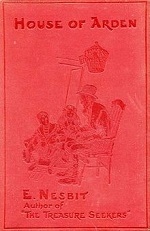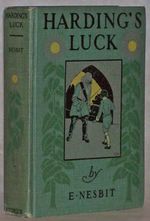|  | | | | 

| |  | Fabian Time Fantasy #1 | | |
The House of Arden
by E. Nesbit
First publication: The Strand, Jan–Nov 1908

Janet found The House of Arden for me at Christmas in 2014. In the story, Edred Arden, a nine-year-old poor orphan, unexpectedly discovers that he’s actually the next Lord Arden, but still pennyless unless he and his sister can use a trunk of magic clothes to have adventures in past times and discover where the family treasure lies hidden—much like the time-traveling mechanism in Nesbit’s earlier The Story of Amulet. Also like Amulet, this story was initially serialized in The Strand before the book publication. A companion book, Harding’s Luck, appeared the following year.

In the Encyclopedia of Science Fiction, John Clute connects the two books to the Fabian Society (named after the British socialists Fabian Society, which also included included H.G. Wells) because “Nesbit’s consistent Fabian socialism is central to the version of British history’ presented in the books. Hear, Oh badge of Arden’s house, Hear, Oh badge of Arden’s house,
The spell my little age allows;
Arden speaks it without fear,
Badge of Arden’s house, draw near,
Make me brave and kind and wise,
And show me where the treasure lies. 
| |
| | | | |

 | | | | 

| | Fabian Time Fantasies #2
Harding’s Luck
by E. Nesbit
First publication: The Strand, Jan–Nov 1909

Lame and orphaned Dickie Harding has just fallen in with thieves when he’s first taken in by a kind woman (with a pony) and then wakes up in the time of James the First, where he does have some minor encounters with Edred and his sister from The House of Arden. But those encounters aren’t the real story. The real story is that in the past he’s definitely livin’ the life as some sort of royalty, not even lame! How’s he to decide which era to live in? He was very happy. There seemed somehow to be more room in this new life than in the old one, and more time. No one was in a hurry, and there was not another house within a quarter of a mile. All green fields. Also he was a person of consequence. The servants called him “Master Richard,” and he felt, as he heard them, that being called Master Richard meant not only that the servants respected him as their master’s son, but that he was somebody from whom great things were expected. That he had duties of kindness and protection to the servants; that he was expected to grow up brave and noble and generous and unselfish, to care for those who called him master. He felt now very fully, what he had felt vaguely and dimly at Talbot Court, that he was not the sort of person who ought to do anything mean and dishonorable, such as being a burglar, and climbing in at pantry windows; that when he grew up he would be expected to look after his servants and laborers, and all the men and women whom he would have under him—that their happiness and well-being would be his charge. And the thought swelled his heart, and it seemed that he was born to a great destiny. He—little lame Dickie Harding of Deptford—he would hold these people’s lives in his hand. Well, he knew what poor people wanted; he had been poor—or he had dreamed that he was poor—it was all the same. Dreams and real life were so very much alike. He was very happy. There seemed somehow to be more room in this new life than in the old one, and more time. No one was in a hurry, and there was not another house within a quarter of a mile. All green fields. Also he was a person of consequence. The servants called him “Master Richard,” and he felt, as he heard them, that being called Master Richard meant not only that the servants respected him as their master’s son, but that he was somebody from whom great things were expected. That he had duties of kindness and protection to the servants; that he was expected to grow up brave and noble and generous and unselfish, to care for those who called him master. He felt now very fully, what he had felt vaguely and dimly at Talbot Court, that he was not the sort of person who ought to do anything mean and dishonorable, such as being a burglar, and climbing in at pantry windows; that when he grew up he would be expected to look after his servants and laborers, and all the men and women whom he would have under him—that their happiness and well-being would be his charge. And the thought swelled his heart, and it seemed that he was born to a great destiny. He—little lame Dickie Harding of Deptford—he would hold these people’s lives in his hand. Well, he knew what poor people wanted; he had been poor—or he had dreamed that he was poor—it was all the same. Dreams and real life were so very much alike. 
| |
| | | | |

| |